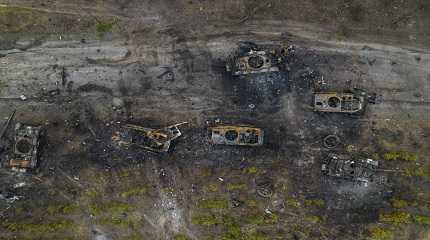
KYIV, Sept 5 (Reuters) - Ukraine made its boldest claim yet of success on the battlefield in its week-old counter-offensive against Russian forces in the south, while European markets went into free-fall on Monday after Russia kept its main gas pipeline to Germany shut.
Following days of silence about their new offensive, Ukrainian officials posted an image online of three soldiers raising a flag over a town in Kherson province, a southern region occupied by Russia since the war's early days.
The image of the flag being fixed to a pole on a rooftop, purportedly in Vysokopyllya in the north of Kherson, was released as President Volodymyr Zelenskiy said Ukrainian forces had captured two towns in the south and one in the east. In an overnight address, he did not identify the locations.
After months of enduring punishing Russian artillery assaults in the east, Ukraine has at last begun its long-awaited counter-attack, its biggest since it repelled Russian forces from the outskirts of Kyiv in March.
Ukraine had kept most details of its new campaign under wraps, banning journalists from the frontline and offering little public commentary in order to preserve tactical surprise.
Russia has said it has pushed back assaults in Kherson, but in a rare acknowledgment of the Ukrainian counter-offensive, TASS news agency quoted a Moscow-installed official in the region as saying plans for a referendum on joining Russia had been put on hold due to the security situation.
Mark Hertling, a retired former commander of U.S. ground forces in Europe, said Kyiv's aim seemed to be to trap thousands of Russian troops on the east bank of the vast Dnipro River, destroying bridges that are both supply and escape routes.
Russia had left "a force in Kherson, with a river at their back & limited supply lines", and Ukraine was hitting them with "precision weapons", Hertling tweeted.
REVERSING GAINS
Zelenskiy's announcement that a town had been captured in the east suggested Ukraine was taking advantage of pressure in the south to try to reverse some of the gains Russia made elsewhere in recent months.
In his evening address on Sunday, Zelenskiy tempered his announcements of success with a warning to European countries that they could face a cold winter.
Moscow blames disruption to equipment repairs and maintenance caused by Western sanctions for its halt to the flow of gas through Nord Stream 1, its main pipeline to Germany. Russia was due to reopen the pipeline on Saturday but has said it will stay shut indefinitely.
"Problems with gas supply arose because of the sanctions imposed on our country by Western states, including Germany and Britain," Kremlin spokesman Dmitry Peskov said on Monday.
European countries and the United States say Russia is using energy as a weapon but that they are collaborating to ensure supplies.
"As a result of these efforts, European gas storage will be full by the critical winter heating season," a White House official said. "We have more work to do."
Led by Germany, European countries have rolled out billions of euros in aid for consumers and businesses, which last week helped drive European gas prices back down sharply from record highs.
BLEAK WINTER
But the weekend news about Nord Stream's extended shutdown sent prices soaring once again on Monday, with the main European benchmark up by more than 35%, bringing fears of a bleak winter for consumers and businesses across the continent.
Germany's DAX share index was down well over 2%, the Euro sank below 99 U.S. cents for the first time in decades, and the pound was not far off mid-1980s lows against the dollar as Liz Truss was announced as Britain's next prime minister.
Speaking shortly beforehand, Kremlin spokesman Peskov was scathing about Truss, saying that anti-Russian rhetoric from Britain meant relations could get even worse.
"I don't think that we can hope for anything positive," he said.
Peskov also said Moscow planned to retaliate for the latest Western move: a proposed cap on the price of Russian oil exports from December designed to reduce Moscow's main source of income.
In Russia, which has effectively banned independent media since President Vladimir Putin launched his "special military operation" in February, a judge revoked the license of liberal newspaper Novaya Gazeta, one of the last unofficial voices.
The ruling was "a political hit job, without the slightest legal basis", said its editor, Dmitry Muratov, who won last year's Nobel Peace Prize for the paper's fight for free speech.
A Russian court also sentenced a former journalist to 22 years in prison for treason after prosecutors said he disclosed state secrets, His supporters say the case is retribution for him exposing details of Russia's international arms deals.
Ukraine's Prime Minister Denys Shmyhal urged the European Union on Monday to supply Kyiv with more weapons and equipment while offering to help out with gas deliveries to reduce the bloc's dependence on Russia.
With fighting shifting to southern Ukraine, international attention has focused in recent weeks on the Zaporizhzhia nuclear power station, captured by Russia but still operated by Ukrainian engineers and hooked to Ukraine's power grid.
Both sides accuse each other of risking nuclear catastrophe by shelling near the plant. Ukraine's state nuclear company Energoatom said the its last working reactor block disconnected from Ukraine's grid on Monday after Russian shelling disrupted power lines. There was no immediate comment from Russia.
Ukraine's presidential adviser Mykhailo Podolyak advised residents of Russian-annexed Crimea, further south, to prepare bomb shelters and stock up on supplies "during de-occupation measures".
"Everything will be Ukraine," he wrote on Twitter.




